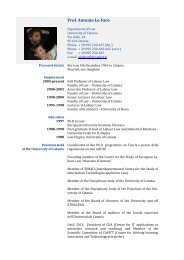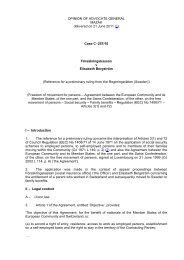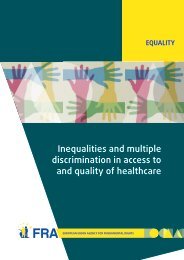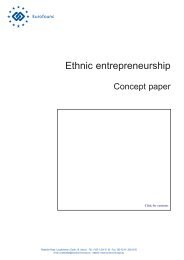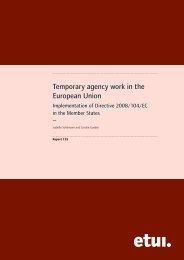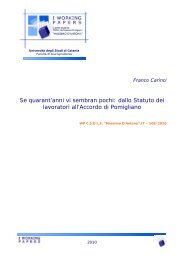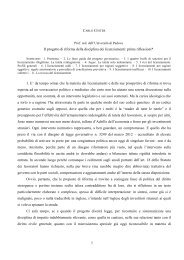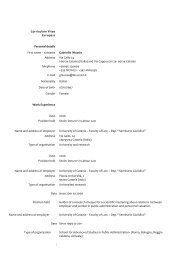Study on non-legislative initiatives for companies to promote gender ...
Study on non-legislative initiatives for companies to promote gender ...
Study on non-legislative initiatives for companies to promote gender ...
You also want an ePaper? Increase the reach of your titles
YUMPU automatically turns print PDFs into web optimized ePapers that Google loves.
88 Gender equality <strong>initiatives</strong><br />
• <strong>to</strong> share experience and results of <strong>initiatives</strong> launched <strong>on</strong> the basis of the<br />
charter, <strong>for</strong> example, by submitting c<strong>on</strong>tributi<strong>on</strong>s <strong>to</strong> the Minister <strong>for</strong> Gender<br />
Equality’s theme page <strong>on</strong> women and management <strong>on</strong> the Internet.<br />
The charter should be both flexible and binding <strong>for</strong> enterprises; there<strong>for</strong>e, every enterprise<br />
has <strong>to</strong> set specific goals. Targets and the means <strong>to</strong> reach these targets are<br />
<strong>for</strong>mulated by the enterprise, in collaborati<strong>on</strong> with the Department of Gender Equality,<br />
and described in a baseline-report. The enterprise is expected <strong>to</strong> submit a report <strong>on</strong> the<br />
progress of its activities every sec<strong>on</strong>d year. Thus, the enterprises having signed the<br />
charter are obliged <strong>to</strong> initiate programmes promoting more women in management and<br />
<strong>to</strong> evaluate the measures set.<br />
A regi<strong>on</strong>al initiative in Bourgogne in France resulted from EQUAL and addresses<br />
various <strong>gender</strong> equality aspects. Several organisati<strong>on</strong>s <strong>to</strong>ok part in a reflecti<strong>on</strong> which<br />
resulted in the elaborati<strong>on</strong> of several charters: public administrati<strong>on</strong>s <strong>for</strong> employment,<br />
career advice and training; universities; local authorities and employer organisati<strong>on</strong>s.<br />
The French “Chartes régi<strong>on</strong>ales égalité et mixité professi<strong>on</strong>elles” (regi<strong>on</strong>al<br />
charters <strong>for</strong> <strong>gender</strong> equality and <strong>gender</strong>-mixed work) are regi<strong>on</strong>al networks of charters<br />
aiming at promoting equality between women and men in the labour market as well as<br />
<strong>gender</strong>-mixed work. By signing <strong>on</strong>e of the charters, organisati<strong>on</strong>s become part of a<br />
network which works in favour of <strong>gender</strong> equality. The regi<strong>on</strong>al charters have been<br />
initiated by a n<strong>on</strong>-profit organisati<strong>on</strong>, Féminin Technique (FETE). FETE was founded in<br />
1991 <strong>to</strong> <strong>promote</strong> <strong>gender</strong> equality <strong>on</strong> the labour market and in the workplace and <strong>to</strong> help<br />
labour market ac<strong>to</strong>rs <strong>to</strong> achieve this. One of the main axes of this objective is the<br />
promoti<strong>on</strong> of <strong>gender</strong> diversity in educati<strong>on</strong>, training and job positi<strong>on</strong>s.<br />
The “Charte égalité et mixité professi<strong>on</strong>nelle” was the outcome of an EQUAL project<br />
and was launched in May 2005. FETE aims at involving all organisati<strong>on</strong>s having an<br />
impact <strong>on</strong> career design and job searching: private corporati<strong>on</strong>s, trade uni<strong>on</strong>s, schools,<br />
universities, job training organisati<strong>on</strong>s, career advice or counselling organisati<strong>on</strong>s,<br />
public job centres, private temp agencies, local government authorities.<br />
Be<strong>for</strong>e an organisati<strong>on</strong> signs the Charter, FETE c<strong>on</strong>ducts an interview with the pers<strong>on</strong><br />
in charge of HR in order <strong>to</strong> make an account of acti<strong>on</strong>s which were settled by the<br />
company so far. Commitments taken in the signed charter can be adapted <strong>to</strong> the<br />
signing organisati<strong>on</strong>. A specific model of charter was designed <strong>for</strong> trade uni<strong>on</strong>s in order<br />
<strong>to</strong> address their specific issues. Organisati<strong>on</strong>s designed a particular text <strong>for</strong> their<br />
charter with FETE as they were not satisfied with existing models of charters. Some of<br />
them suppressed the engagement about work-life balance of employees which was<br />
suggested in their model: they c<strong>on</strong>sidered that work-life balance is not an issue which<br />
must be addressed by employers.<br />
Signing organisati<strong>on</strong>s may also c<strong>on</strong>duct their own promoti<strong>on</strong> acti<strong>on</strong>s about their signing<br />
the charter. For example, the commitment of a city in favour of <strong>gender</strong> equality through<br />
the charter was menti<strong>on</strong>ed in the media as it signed the charter in a public and <strong>for</strong>mal<br />
c<strong>on</strong>text: the charter was signed at the end of the first “Techni’Femmes” 28 which <strong>to</strong>ok<br />
place in the city with other signing organisati<strong>on</strong>s.<br />
28<br />
FETE organises “Techni’Femmes”, an event which targets women looking <strong>for</strong> a job or wishing <strong>to</strong><br />
change careers as well as female students. During this event, corporati<strong>on</strong>s from industrial sec<strong>to</strong>rs open<br />
their doors <strong>to</strong> women so they can discover technical job positi<strong>on</strong>s which are traditi<strong>on</strong>ally held by men.




